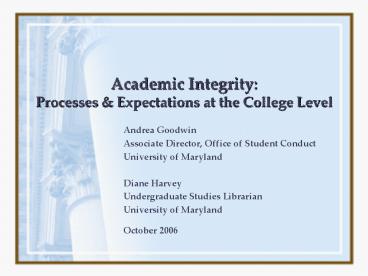Academic Integrity: Processes - PowerPoint PPT Presentation
1 / 20
Title:
Academic Integrity: Processes
Description:
fabrication. facilitating academic dishonesty. plagiarism. Cheating ... Fabrication. Intentional and unauthorized falsification or ... – PowerPoint PPT presentation
Number of Views:50
Avg rating:3.0/5.0
Title: Academic Integrity: Processes
1
Academic IntegrityProcesses Expectations at
the College Level
- Andrea Goodwin
- Associate Director, Office of Student Conduct
- University of Maryland
- Diane Harvey
- Undergraduate Studies Librarian
- University of Maryland
- October 2006
2
Agenda
- Importance of Integrity
- Academic Integrity processes at UM
- Academic Integrity Violations
- UM Libraries efforts
- Suggestions for prevention
- Expectations for students
3
Setting and enforcing high standards for
academic integrity goes beyond simple moralism.
It also helps students develop values that are
necessary for living in--and contributing to-- a
society where people routinely depend upon the
knowledge and integrity of others. Gary
Pavela University of Maryland
4
UM Academic Integrity Code
The UM Code of Academic Integrity instituted in
1990-1991 academic year. www.shc.umd.edu/code.html
Modified code. Authority lies with the
students.
5
Student Honor Council
- The UM Honor Council receives approximately 300
allegations per academic year - Over 70 of those students are found responsible.
- The XF penalty is imposed in more than 80 of
the cases in which students are found
responsible.
6
The Honor Pledge
I pledge on my honor that I have not given
or received any unauthorized assistance
on this assignment/examination.
7
Types of Violations
- Four possible charges of academic dishonesty,
according to the - Code of Academic Integrity
- cheating
- fabrication
- facilitating academic dishonesty
- plagiarism
8
Cheating
- Intentionally using or attempting to use
unauthorized - materials, information, or study aids in any
academic - exercise.
- Examples include
- Looking at someones paper or using a cheat
sheet while taking an exam - Allowing someone to take an exam for you
- Submitting the same work more than once for
credit without the professors permission - Using memory calculators with stored exam
information while taking a test
9
Fabrication
- Intentional and unauthorized falsification or
- invention of any information or citation in an
- academic exercise.
- Examples include
- Making up data on a lab experiment.
- Making up a source to use as a citation in a
paper (Internet makes this very easy).
10
Facilitation
- Intentionally or knowingly helping or attempting
to help - another to violate any provision of the Code.
- Examples include
- Giving another student your homework so that
he/she can copy answers (electronic transfers are
common). - Allowing another to copy your answers during an
exam. - Taking an exam for another student
- Giving answers to others in different sections of
the course.
11
Plagiarism
- Intentionally or knowingly representing the words
or - ideas of another as ones own in any academic
exercise. - Examples include
- Quoting a source and failing to give proper
citation. - Putting a sources text into your own words
(paraphrasing) and not citing the source. - Copying someones elses computer code for a
project and submitting it as your own. - Note Internet is 1 source of violations.
Incidents - involving plagiarism have doubled over the past 2
years.
12
Other Types of Violations
- Harassment using email
- Breaking into faculty accounts
- Forging notes from Doctors, etc.
- Text messaging
- Instant messaging
- Changes answers for a regrade
13
UM Libraries Academic Integrity Initiative
- Collaborative effort with campus partners
- Office of Student Conduct
- Student Honor Council
- Freshman Writing Program
- Professional Writing Program
- Center for Teaching Excellence
- Writing Center
- Project NEThics
- The Graduate School
- Focus on education and prevention
14
Academic Integrity Initiative Activities
- Campus Summit on Academic Integrity
- Web pages for students and faculty (one-stop
information source for campus) - www.lib.umd.edu/guides/honesty.html
- Training for ENGL 101 instructors and Writing
Center tutors - Informational handouts for undergraduate and
graduate students - Workshops for faculty through Center for Teaching
Excellence - K16 collaborations (K16 Partnership committee,
presentations to local school media specialists)
15
Prevention in the Classroom
- Set clear expectations with students. Discuss
academic integrity at the beginning of the course
and place on the syllabus. - Switch exams and assignments each semester. Ask
students to turn in 2 copies of assignments. Keep
copies of exams and papers for all of your
students. - Give oral and written instructions concerning
material allowed or not allowed to be used during
an exam at the beginning of the test.
16
Prevention (cont)
- Have students put books, backpacks or other items
not permitted during exams either under their
chairs or in the front of the room. - Instruct students that materials not permitted
for use during exams must be put away so they
are not visible to anyone. - Allow students exam aids to eliminate the need
for "cheat" sheets or calculators with
unauthorized information on them.
17
Prevention (cont)
- Use proctors to monitor exams when necessary
(e.g., in large classes or crowded rooms).
Proctors are present to assist students in
maintaining standards of academic integrity, and
to confront and report academic misconduct. - Distribute blank paper with exams so students can
use it for scratch and cover completed work.
Dont post answers until after all sections have
taken the exam.
18
Prevention (cont.)
- Design research paper assignments to discourage
plagiarism by using specific/personalized topics,
or changing topics every semester. - Require submission of interim products, such as
drafts of research papers. - Make sure students have the necessary
paraphrasing and citation skills they need to
complete an assignment.
19
Expectations for entering students
- Know why, when, how to cite
- Practice responsible test-taking behaviors
- Understand permissible collaboration
20
Thank you!
- Andrea Goodwin
- agoodwin_at_umd.edu
- Diane Harvey
- dkharvey_at_umd.edu































